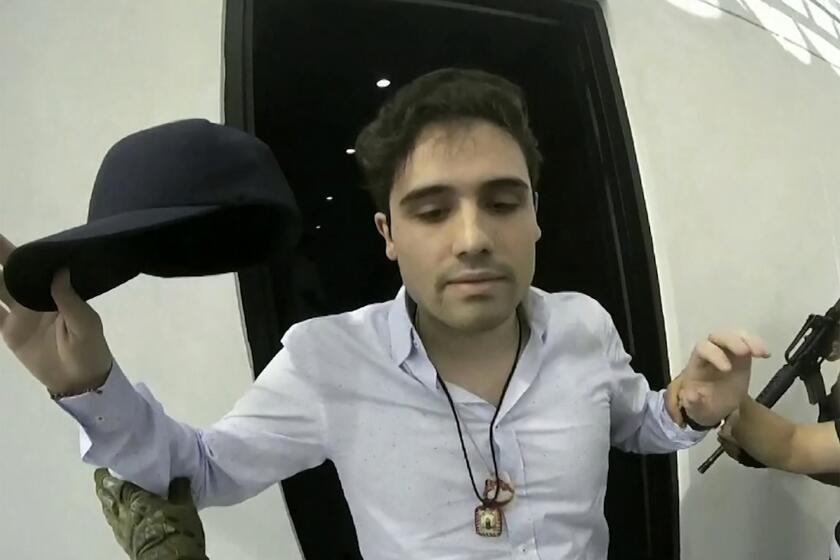A Rising Tension Between Mexican President and U.S. Lawyer
A heated public conflict has emerged between Mexican President Claudia Sheinbaum and Jeffrey Lichtman, a prominent New York attorney representing Ovidio Guzmán López, the son of the late drug kingpin Joaquín “El Chapo” Guzmán. This dispute has sparked speculation that Ovidio might reveal sensitive information about corrupt Mexican officials if he cooperates with U.S. prosecutors.
The Legal Battle Begins
In response to the controversy, Sheinbaum filed a defamation complaint in Mexico against Lichtman, who represents Ovidio Guzmán López. Last week, Ovidio pleaded guilty in a federal court in Chicago to fentanyl trafficking and other charges, agreeing to cooperate with U.S. authorities to potentially reduce his sentence.
During a court hearing, Lichtman dismissed Sheinbaum’s claims that Washington should work closely with Mexico on the case, particularly if Ovidio shares details about alleged connections between Mexican officials and drug cartels. On social media, Lichtman criticized Sheinbaum’s government, calling it “corrupt” and accusing her of acting more like a public relations representative for a drug organization than a legitimate leader.
Political Reactions and Backlash
The remarks from Lichtman triggered strong reactions from Sheinbaum’s allies within the Morena party, which holds significant political power in Mexico. Ernestina Godoy Ramos, Sheinbaum’s official counsel, called Lichtman’s comments “grotesque and unforgivable,” emphasizing that they crossed ethical and legal boundaries.
Sheinbaum herself stated she would not engage in dialogue with a lawyer representing a narco-trafficker, highlighting her stance on the issue. Lichtman also previously represented El Chapo, who is currently serving a life sentence in a U.S. prison. Additionally, he is the attorney for another son of the drug lord, Joaquín Guzmán López, who is also in U.S. custody and faces similar charges.
The Sinaloa Cartel’s Legacy
El Chapo’s sons, known as Los Chapitos, have taken over cartel operations after their father’s arrest in 2016. Ovidio was extradited to the United States in 2023 following a violent confrontation in Culiacán that resulted in numerous casualties. Two other sons remain in Mexico, directing cartel activities, according to U.S. officials.
Speculation About Cooperation
Behind the tension lies a growing belief that Ovidio may be cooperating with U.S. authorities to expose potential corruption among Mexican politicians. In May, 17 members of El Chapo’s family, including his ex-wife and mother of Ovidio and Joaquín, were escorted into San Diego from Tijuana. While the U.S. Justice Department remained silent, Mexican law enforcement suggested this move could be part of a deal between Ovidio and Washington.
Political analysts speculate that this cooperation might be a strategy by the Trump administration to pressure Mexico to address deep ties between organized crime and politics. Although Trump has praised Sheinbaum, he has criticized what he calls an “intolerable alliance” between Mexico’s government and criminal organizations.
Historical Context of Corruption
The relationship between Mexican officials and drug cartels has a long history. Genaro García Luna, a top security official under former President Felipe Calderón, was convicted of accepting millions in bribes from Sinaloa cartel members and is now serving a 38-year prison sentence in the U.S.
Sheinbaum and her mentor, former President Andrés Manuel López Obrador, have publicly supported the prosecution of García Luna, which exposed corruption among their political rivals. However, the situation may be shifting as new allegations could emerge from Ovidio’s cooperation with U.S. authorities.
Potential Implications for Mexican Politics
Experts suggest that any new accusations against López Obrador, Sheinbaum’s predecessor and founder of the Morena party, could cause significant political upheaval. During his term, López Obrador denied reports of receiving donations from individuals linked to organized crime.
The possibility of such revelations has created uncertainty and fear within the Mexican presidency. Journalist José Luis Montenegro, who wrote a book on Los Chapitos, noted that Morena politicians are likely feeling anxious.
Diplomatic Tensions and Public Outrage
Sheinbaum has been praised for her calm approach to dealing with U.S. policies on tariffs, immigration, and drug smuggling. However, she has criticized U.S. prosecutors for seeking cooperation with El Chapo’s son while simultaneously designating the Sinaloa cartel as a terrorist organization.
Sheinbaum has questioned the consistency of U.S. positions, asking where the stance of “not negotiating with terrorist groups” stands in light of these actions.
Mexican officials are still upset about the U.S.-orchestrated capture of Ismael “El Mayo” Zambada, co-founder of the Sinaloa cartel, who is now in U.S. custody. Mexican authorities suspect that U.S. agents recruited Joaquín Guzmán López to abduct El Mayo and bring him to the U.S.
This incident led to a civil war within the cartel, resulting in hundreds of deaths. Now, three top Sinaloa cartel figures are in U.S. custody, and one, Ovidio Guzmán López, seems ready to make a deal that could expose a network of corruption, shaking Mexican politics.







